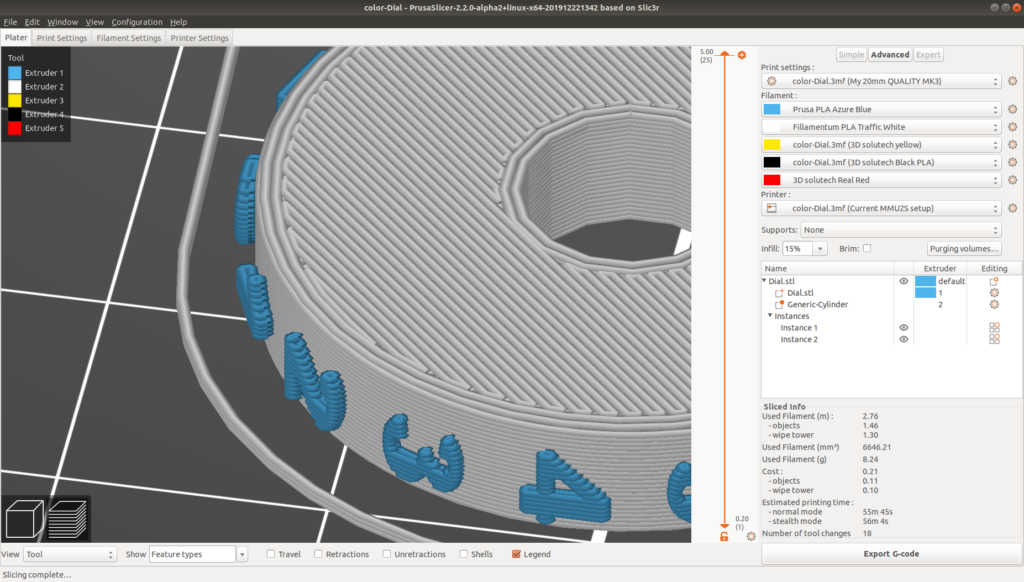Slicing for other-color overhangs
I've had an issue a few times that I think should be addressable with better slicing behavior. I'm wondering whether anyone's developed a solution.
The basic situation is where an overhang which would print fine in a single-filament has problems because it is extruded from a separate filament.
One example is when trying to make a multicolor version of the dials here:
https://www.thingiverse.com/thing:64168/files
Here is a slot of the slicing in single-color mode:
And here is a slot of the slicing with the digits in a second color (using modifier meshes):
Even though the digit overhangs work very nicely in the single color mode, the multicolor version struggles, as the first bits of blue are just floating in thin air, so to speak.
It seems that the solution should be to slice the model differently, so that each blue overhang is part of a larger extruded path, the rest of which is in the interior of the model. I'm wondering if anyone knows good ways to achieve this?
I'm attaching the 3mf file for the modified dial.
RE: Slicing for other-color overhangs
How far into the main part do the numbers extend. I find that a 1-2mm intrusion into the main body helps with things like this. Sometimes, however, the sliver just doesn't want to play nice with where it starts printing and you have to add supports.
RE: Slicing for other-color overhangs
He's using a cylindrical modifier mesh, so they do not extend.
Unfortunately, or fortunately, depending on your viewpoint, slicers are "dumb" in that they do exactly what you tell them. I'd actually prefer that rather than have it try to be smart about what it thinks I'm trying to do and be wrong, and having to spend hours fighting a "feature" to get the desired print I want.
The solution here is you need to alter the model. Split it and extrude the numbers into the dial itself to manually do the embedding, or use a tool capable of painting meshes to "carve" them into the base dial, e.g. meshmixer. It's not a particularly fun process; I've gone through it myself to produce MMU variants of the infamous curta calculator 3d print.
Sheet metal mode in F360 and being able to roll/unroll bends helps a lot. You can edit STLs by converting to BReps first. My process there was to essentially re-extrude the numbers as an interference part and take advantage of the feature in slicer that clips intersecting STLs in MM mode.
RE: Slicing for other-color overhangs
He's using a cylindrical modifier mesh, so they do not extend.
Oh. I didn't know about that trick. Definitely won't work here, but I can think of some areas where I could have used that feature to make life easier.
The solution here is you need to alter the model. Split it and extrude the numbers into the dial itself to manually do the embedding, or use a tool capable of painting meshes to "carve" them into the base dial, e.g. meshmixer. It's not a particularly fun process; I've gone through it myself to produce MMU variants of the infamous curta calculator 3d print.
That's an understatement! I have a couple of detailed single STL models I've been trying to convert off and on for about 8 months with no success. This is my greatest disappointment and frustration with the MMU, the tools simply aren't there for those that can't build their own models.
Even the tools like BigBrain3D's and the one for the Palette that let you paint models don't do a good for high detail stuff and you end up with nasty gaps or disconnected bits that will never print correctly.
RE: Slicing for other-color overhangs
@vintagepc
Thanks for the reply! I ended up doing this shortly after posting. I put the result here:
https://www.thingiverse.com/thing:4103824
Personally, it seems to me that the slicer's job should be to recreate the STL exactly on the exterior of the model, but give flexibility to how the interior is sliced (which it does do with respect to infill, etc.) For that reason, it seems natural to want a slicer which can ensure that overhanging paths are anchored to the interior of the model.
RE: Slicing for other-color overhangs
There are arguments for and against either case, I suppose. You could always put in a request for making this a toggle-able feature on the PrusaSlicer github issue tracker. That'll at least put it on the radar for consideration.

